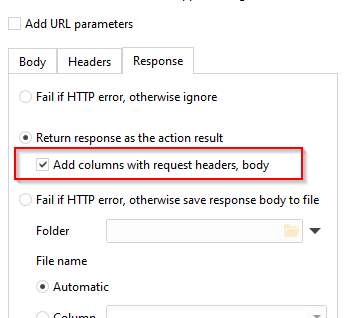Hi
Thanks. Maybe I will upload an example  with my solution so that you can verify if that’s the solution you proposed.
with my solution so that you can verify if that’s the solution you proposed.
Thanks
Hi
Thanks. Maybe I will upload an example  with my solution so that you can verify if that’s the solution you proposed.
with my solution so that you can verify if that’s the solution you proposed.
Thanks
Hi @dgudkov - I’m following up on the “Parse JSON” feature. Are you and the team still targeting end of November or a bit further out?
Version 4.1 is 95% ready and will be released next week (before Dec 6th) - we’re a few days off the timeline. It will come with both “Parse JSON” and “Construct JSON” actions.
Hi Dmitry,
Is it possible to add a feature in the iterate web request action so that we can select an ID column that we want to keep after the iteration web request has run ?
e.g. we want to match addresses, so to each record we add a rownumber which will be our ID.
After the iterate web request action, the ID column is gone because the whole dataset is overwritten by the output of the iterate web request. If we could select in the iterate web request action which ID column to keep in order to join our dataset back, this would be nice.
Hi Nikolaas,
you can preserve request body and headers in responses. That should make it possible to link IDs to responses.

Hi Dmitry,
Yes indeed but it needs some extra processing because we need to parse the JSON using jsonvalue() or the JSON-parse action if I am not mistaken. It would be nice if we could just select the “ID” columns that we want to keep after iterate web request had run. I don’t know if it is technically possible.
Kind regards
Nikolaas
Yes, it requires using extra calculation with a function like jsonvalue() but it’s less restrictive than having a hardcoded ID column and keeps the door open for other scenarios (e.g. composite keys).